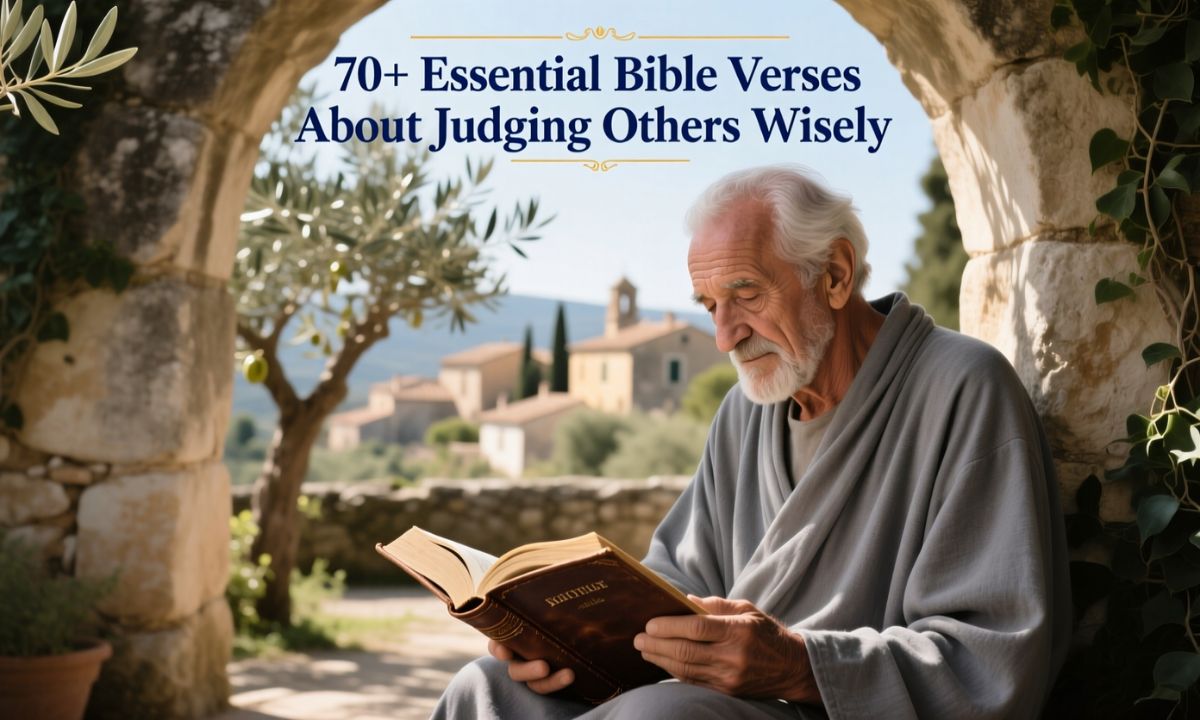Judging others is something we all do at times, but the Bible teaches us to do it with care and wisdom. God’s Word reminds us that only He knows every heart and motive. These verses help us understand how to correct others with love, not pride. When we judge wisely, we reflect God’s truth and compassion.
The Bible encourages believers to be humble and patient when forming opinions about others. Quick judgment can lead to misunderstanding and hurt. But when guided by Scripture, our words and actions can bring peace and healing. These verses show how to balance truth, mercy, and grace in everyday life.
Understanding Judgment in the Bible
The Bible portrays judgment as an expression of God’s perfect justice and holiness. It emphasizes that every person will one day give an account for their actions, encouraging believers to live with integrity, repentance, and faith in God’s mercy.
Defining Judgment with Biblical Insight
Biblical judgment is not about criticism but understanding truth through love. The Bible urges us to act justly, show kindness, and walk humbly with God (Micah 6:8). Genuine judgment brings together truth with compassion, and justice with mercy.
Bible Verses about Judging Each Other
Here are nine powerful verses that reveal how the Bible guides us in understanding true judgment:
Matthew 7:1-2 (NIV) 🌿 “Do not judge, or you too will be judged. For in the same way you judge others, you will be judged, and with the measure you use, it will be measured to you.”
Jesus reminds us that judgment is a two-way street. When we judge others harshly, we invite the same standard upon ourselves. Compassion should guide our hearts before criticism does.
Romans 14:10 (NIV) 🌟 “You, then, why do you judge your brother or sister? Or why do you treat them with contempt? For we will all stand before God’s judgment seat.”
Paul teaches that every person is accountable to God, not to human opinion. Instead of condemning others, we should focus on living faithfully before the Lord.
James 4:11-12 (NIV) 🌿 “Brothers and sisters, do not slander one another. Anyone who speaks against a brother or sister or judges them speaks against the law and judges it… There is only one Lawgiver and Judge.”
This verse reminds us that only God has the authority to judge. Our role is to love and uplift one another, leaving justice in His perfect hands.
Luke 6:37 (NIV) ✨ “Do not judge, and you will not be judged. Do not condemn, and you will not be condemned. Forgive, and you will be forgiven.”
Jesus connects judgment, condemnation, and forgiveness. A merciful heart opens the door for God’s mercy to flow back into our lives.
John 7:24 (NIV) 🌼 “Stop judging by mere appearances, but instead judge correctly.”
Christ calls for discernment rooted in truth, not outward impressions. True judgment sees beyond the surface and aligns with God’s wisdom.
Romans 2:1 (NIV) 🌿 “You, therefore, have no excuse, you who pass judgment on someone else, for at whatever point you judge another, you are condemning yourself.”
Paul warns that when we judge others, we expose our own flaws. Self-reflection and humility should come before pointing fingers.
1 Corinthians 4:5 (NIV) 🌟 “Therefore judge nothing before the appointed time; wait until the Lord comes. He will bring to light what is hidden in darkness.”
God alone sees every heart and motive. We are called to patience, trusting that His final judgment will reveal the full truth.
Matthew 7:3-5 (NIV) 🌿 “Why do you look at the speck of sawdust in your brother’s eye and pay no attention to the plank in your own eye?”
Jesus challenges hypocrisy by urging us to address our own faults first. True spiritual growth begins with self-examination, not condemnation.
Galatians 6:1 (NIV) ✨ “Brothers and sisters, if someone is caught in a sin, you who live by the Spirit should restore that person gently.”
Paul teaches that correction should come with gentleness and love. Judgment without compassion divides, but restoration with grace heals.
The Righteous Judge

The Bible describes God as the Righteous Judge who rules with fairness and truth. His judgments are perfect, guided by love and holiness. Believers can trust that He sees every heart and will judge with justice and mercy.
God’s Role as the Ultimate Judge
The Bible makes it clear that God alone holds the final authority to judge every heart. His justice is flawless, and His judgments reflect perfect truth and wisdom.
Psalm 9:7-8 (NIV) 🌿 “The Lord reigns forever; he has established his throne for judgment. He rules the world in righteousness and judges the peoples with equity.”
These verses remind us that God’s authority is eternal and His judgments are fair. He rules with perfect balance, showing no favoritism or injustice.
Ecclesiastes 12:14 (NIV) ✨ “For God will bring every deed into judgment, including every hidden thing, whether it is good or evil.”
This verse highlights that nothing escapes God’s notice. His role as Judge ensures that all actions, both seen and unseen, are accounted for in truth.
Romans 2:6 (NIV) 🌟 “God ‘will repay each person according to what they have done.’”
Paul reminds us that God’s judgment is personal and just. Each individual will face a fair evaluation based on their deeds and intentions.
2 Corinthians 5:10 (NIV) 🌿 “For we must all appear before the judgment seat of Christ, that each of us may receive what is due us for the things done while in the body.”
This verse reveals the certainty of divine judgment. God’s justice will bring both accountability and reward according to our faith and actions.
Psalm 96:13 (NIV) 🌼 “Let all creation rejoice before the Lord, for he comes to judge the earth. He will judge the world in righteousness and the peoples in his faithfulness.”
God’s judgment is a reason for joy, not fear. It reflects His faithfulness, bringing justice and restoration to the entire world.
Hebrews 10:30 (NIV) ✝️ “For we know him who said, ‘It is mine to avenge; I will repay,’ and again, ‘The Lord will judge his people.’”
This verse emphasizes God’s sole right to vengeance and judgment. His justice is absolute and driven by divine wisdom, not human emotion.
Acts 17:31 (NIV) 🌟 “For he has set a day when he will judge the world with justice by the man he has appointed. He has given proof of this to everyone by raising him from the dead.”
Here, Paul points to Jesus as the appointed Judge of all humanity. The resurrection affirms Christ’s divine authority to judge with truth and fairness.
Revelation 20:12 (NIV) 🌿 “And I saw the dead, great and small, standing before the throne, and books were opened… The dead were judged according to what they had done.”
John’s vision reveals the final judgment before God’s throne. It reminds believers that every life will be measured by God’s perfect justice and truth.
Our Role in Judging Other Believers
Though God holds final authority, believers are called to exercise wise and loving discernment. Scripture encourages gentle correction to help one another grow in faith.
Galatians 6:1 (NIV) 💛 “Brothers and sisters, if someone is caught in a sin, you who live by the Spirit should restore that person gently. But watch yourselves, or you also may be tempted.”
Paul reminds believers that correction should come with humility and gentleness. True spiritual judgment helps restore, not condemn, a fellow believer.
Matthew 18:15 (NIV) 🌿 “If your brother or sister sins, go and point out their fault, just between the two of you. If they listen to you, you have won them over.”
Jesus teaches that loving confrontation brings reconciliation. Private, respectful correction builds unity and preserves relationships within the faith.
1 Corinthians 5:12-13 (NIV) 🕊️ “What business is it of mine to judge those outside the church? Are you not to judge those inside? God will judge those outside. ‘Expel the wicked person from among you.’”
Paul explains that believers have a shared responsibility for accountability within the church. This kind of judgment promotes purity and honors God’s standards.
The Difference Between Righteous Judgment and Hypocrisy
Righteous judgment comes from a sincere heart seeking truth, while hypocrisy judges others without examining one’s own faults.
Romans 2:1 (NIV) ⚖️ “You, therefore, have no excuse, you who pass judgment on someone else, for at whatever point you judge another, you are condemning yourself, because you who pass judgment do the same things.”
Paul warns that hypocrisy in judgment exposes our own guilt. True righteousness begins with honest self-reflection before pointing out others’ faults.
Matthew 23:27 (NIV) 🕊️ “Woe to you, teachers of the law and Pharisees, you hypocrites! You are like whitewashed tombs, which look beautiful on the outside but on the inside are full of the bones of the dead and everything unclean.”
Jesus condemns outward religion without inward purity. Righteous judgment flows from a sincere, transformed heart not from appearance or pride.
John 7:24 (NIV) 🌿 “Stop judging by mere appearances, but instead judge correctly.”
Christ teaches that godly judgment requires spiritual insight, not surface evaluation. It calls for fairness and truth rooted in God’s Word.
Galatians 6:3 (NIV) 💛 “If anyone thinks they are something when they are not, they deceive themselves.”
Paul reminds believers to stay humble when addressing others’ faults. A self-righteous attitude blinds us to our own need for grace.
Proverbs 21:2 (NIV) 🌟 “A person may think their own ways are right, but the Lord weighs the heart.”
God alone sees true motives behind every action. Righteous judgment depends on aligning our hearts with His, not relying on human pride or assumption.
Reflect Before You Judge
Before passing judgment, the Bible urges us to pause and reflect on our own hearts, ensuring our motives are pure and guided by love.
The Measure You Use Will Be Measured to You
Jesus reminds us that the way we judge others will return to us, urging fairness, compassion, and humility in our judgments.
Matthew 7:2 (NIV) ⚖️ “For in the same way you judge others, you will be judged, and with the measure you use, it will be measured to you.”
Jesus emphasizes that our treatment of others sets the standard for how we will be treated. Mercy and fairness invite the same in return.
Luke 6:38 (NIV) 🌿 “Give, and it will be given to you. A good measure, pressed down, shaken together and running over, will be poured into your lap. For with the measure you use, it will be measured to you.”
This verse reminds believers that generosity and kindness never go unrewarded. God multiplies the goodness we extend to others.
Mark 4:24 (NIV) ✨ “Consider carefully what you hear,” he continued. “With the measure you use, it will be measured to you and even more.”
Jesus urges careful listening and discernment. When we respond to His truth rightly, blessings and understanding grow abundantly.
Romans 2:1 (NIV) 🕊️ “You, therefore, have no excuse, you who pass judgment on someone else, for at whatever point you judge another, you are condemning yourself.”
Paul warns that unfair judgment turns back on the one who judges. It’s a call to humility and honest self-reflection before criticizing others.
James 2:13 (NIV) 💛 “Because judgment without mercy will be shown to anyone who has not been merciful. Mercy triumphs over judgment.”
James reminds us that mercy has the final word. When we show compassion, we reflect God’s grace and invite His mercy upon ourselves.
Be Slow to Judge Others

The Bible teaches us to be patient and thoughtful before judging others, reminding us that hasty judgments can lead to misunderstanding and harm.
James 1:19 (NIV) 🌿 “My dear brothers and sisters, take note of this: Everyone should be quick to listen, slow to speak and slow to become angry.”
James urges believers to pause before reacting. A patient heart leads to wise judgment and prevents unnecessary conflict.
Matthew 7:1-2 (NIV) 💛 “Do not judge, or you too will be judged. For in the same way you judge others, you will be judged, and with the measure you use, it will be measured to you.”
Jesus reminds us that judgment should be approached with caution. The standard we apply to others will one day be applied to us.
Romans 14:13 (NIV) 🌸 “Therefore let us stop passing judgment on one another. Instead, make up your mind not to put any stumbling block or obstacle in the way of a brother or sister.”
Paul calls for patience and understanding in how we view others. Avoiding quick judgments helps preserve peace within the body of Christ.
Proverbs 18:13 (NIV) 🌿 “To answer before listening that is folly and shame.”
This verse reminds us that wise judgment begins with listening. Acting without full understanding leads to unfair conclusions and regret.
John 7:24 (NIV) ✨ “Stop judging by mere appearances, but instead judge correctly.”
Jesus teaches discernment rooted in truth, not assumptions. Taking time to see beyond outward appearances helps us reflect God’s justice and love.
Encouraging Self-Reflection Before Passing Judgment
The Bible urges believers to examine their own hearts before judging others. True wisdom begins with humility, acknowledging our own flaws and seeking God’s guidance before forming opinions about others.
Matthew 7:3-5 (NIV) 🌿 “Why do you look at the speck of sawdust in your brother’s eye and pay no attention to the plank in your own eye?”
Jesus teaches that self-examination must come before correction. We should confront our own shortcomings before pointing out the faults of others.
Romans 2:1 (NIV) 💛 “You, therefore, have no excuse, you who pass judgment on someone else, for at whatever point you judge another, you are condemning yourself.”
Paul reminds us that judging others exposes our own weaknesses. Reflecting on our actions helps us approach others with compassion and grace.
2 Corinthians 13:5 (NIV) 🌸 “Examine yourselves to see whether you are in the faith; test yourselves. Do you not realize that Christ Jesus is in you?”
Paul encourages believers to continually evaluate their faith and motives. Honest self-reflection keeps our hearts aligned with God’s truth.
Galatians 6:4 (NIV) 🌿 “Each one should test their own actions. Then they can take pride in themselves alone, without comparing themselves to someone else.”
This verse calls for personal accountability over comparison. Focusing on our own growth leads to humility and spiritual maturity.
Lamentations 3:40 (NIV) ✨ “Let us examine our ways and test them, and let us return to the Lord.”
Self-reflection is an act of repentance and renewal. By examining our ways, we draw closer to God and develop a heart of understanding rather than judgment.
Love and Judgment
The Bible teaches that love and judgment must walk hand in hand, guided by grace and truth. When love leads, judgment becomes fair, gentle, and rooted in God’s heart.
Prioritizing Love Over Judgment
The Bible teaches that love should always outweigh judgment. When we respond with compassion instead of criticism, we reflect God’s heart and strengthen our relationships in faith.
1 Corinthians 13:4-5 (NIV) 💛 “Love is patient, love is kind. It does not envy, it does not boast, it is not proud.”
Paul reminds us that love chooses kindness over judgment. It focuses on grace and understanding, not on pointing out faults.
James 2:13 (NIV) 🌿 “Because judgment without mercy will be shown to anyone who has not been merciful. Mercy triumphs over judgment.”
James highlights that mercy has greater power than condemnation. When we show mercy, we imitate the love of Christ.
Romans 13:10 (NIV) 🌸 “Love does no harm to a neighbor. Therefore love is the fulfillment of the law.”
Paul teaches that love fulfills every commandment. Choosing love over judgment keeps us in harmony with God’s will.
John 13:34 (NIV) ✨ “A new command I give you: Love one another. As I have loved you, so you must love one another.”
Jesus sets the highest example of love unconditional and forgiving. This kind of love leaves no room for harsh judgment.
Colossians 3:14 (NIV) 🌷 “And over all these virtues put on love, which binds them all together in perfect unity.”
Love is the bond that holds faith and community together. It replaces judgment with unity, peace, and understanding.
Handling Criticism with Grace
Scripture encourages believers to respond to criticism with humility and patience. When we face correction or opposition, God calls us to answer with kindness and wisdom rather than anger.
Proverbs 15:1 (NIV) 🌿 “A gentle answer turns away wrath, but a harsh word stirs up anger.”
Gentle words can calm conflict and build peace. Grace in our response reflects spiritual maturity and self-control.
Ecclesiastes 7:9 (NIV) 🌸 “Do not be quickly provoked in your spirit, for anger resides in the lap of fools.”
The Bible teaches that wisdom comes through calmness. A peaceful heart allows us to handle criticism with grace.
James 1:19-20 (NIV) 💛 “Everyone should be quick to listen, slow to speak and slow to become angry, because human anger does not produce the righteousness that God desires.”
Patience and listening open the door to understanding. When we control our emotions, we reflect God’s righteousness.
Proverbs 12:16 (NIV) ✨ “Fools show their annoyance at once, but the prudent overlook an insult.”
Choosing grace over reaction shows wisdom. Ignoring offense allows God’s peace to guide our hearts.
Romans 12:17-18 (NIV) 🌿 “Do not repay anyone evil for evil. Be careful to do what is right in the eyes of everyone.”
Paul urges believers to pursue peace, even when wronged. Responding with grace honors God and strengthens faith.
Treating One Another with Love

God’s Word calls believers to show love, kindness, and respect toward one another. When we lead with love, we create unity and reflect the character of Christ in our daily lives.
Ephesians 4:2 (NIV) 💛 “Be completely humble and gentle; be patient, bearing with one another in love.”
Paul encourages believers to show humility and patience. Love helps us support each other through every struggle.
1 Peter 4:8 (NIV) 🌿 “Above all, love each other deeply, because love covers over a multitude of sins.”
Peter reminds us that sincere love brings forgiveness and healing. It transforms relationships through grace.
Colossians 3:12 (NIV) 🌸 “Therefore, as God’s chosen people… clothe yourselves with compassion, kindness, humility, gentleness and patience.”
This verse calls believers to reflect Christ’s heart in all interactions. Love should shape our words, actions, and attitudes.
Romans 12:10 (NIV) ✨ “Be devoted to one another in love. Honor one another above yourselves.”
Paul teaches that genuine love places others first. Serving one another with respect builds harmony in the body of Christ.
John 15:12 (NIV) 🌷 “My command is this: Love each other as I have loved you.”
Jesus commands unconditional love that mirrors His own. Through this love, believers reveal God’s presence in the world.
The Wisdom of Restraint
The Bible teaches that true wisdom involves knowing when to speak and when to stay silent. Restraint reflects maturity and trust in God’s timing. It reminds believers that patience often reveals truth more clearly than quick judgment.
Wisdom from the Scriptures
The Bible offers timeless wisdom on how to judge with fairness and mercy. God’s Word encourages believers to seek understanding before speaking and to show love even in correction. These verses remind us that true wisdom begins with humility and compassion.
Proverbs 11:2 (NIV) 🌿 “When pride comes, then comes disgrace, but with humility comes wisdom.”
This verse highlights that wisdom grows from a humble heart. Pride blinds us, but humility opens our eyes to God’s truth.
James 3:17 (NIV) 💛 “But the wisdom that comes from heaven is first of all pure; then peace-loving, considerate, submissive, full of mercy and good fruit, impartial and sincere.”
Heavenly wisdom leads us to act with gentleness and fairness. It promotes peace instead of harsh judgment.
Proverbs 19:20 (NIV) 🌸 “Listen to advice and accept discipline, and at the end you will be counted among the wise.”
True wisdom welcomes correction. Learning from others helps us grow in patience and understanding.
Ecclesiastes 7:9 (NIV) 🌿 “Do not be quickly provoked in your spirit, for anger resides in the lap of fools.”
Wisdom requires restraint and calmness. A patient spirit reflects maturity and prevents rash judgment.
Colossians 3:12 (NIV) ✨ “Therefore, as God’s chosen people, holy and dearly loved, clothe yourselves with compassion, kindness, humility, gentleness and patience.”
Paul reminds us that wisdom is seen in how we treat others. Living with kindness and humility mirrors the heart of Christ.
A Compilation of Verses Promoting Compassion Over Condemnation
Scripture repeatedly teaches that love triumphs over judgment. God’s desire is for His people to extend mercy, forgiveness, and understanding to others. These verses call us to replace criticism with kindness and to reflect God’s heart through compassion.
Luke 6:36 (NIV) 💛 “Be merciful, just as your Father is merciful.”
God’s mercy sets the standard for how we treat others—with grace and understanding rather than condemnation.
Ephesians 4:32 (NIV) 🌿 “Be kind and compassionate to one another, forgiving each other, just as in Christ God forgave you.”
Paul urges believers to forgive as God forgave us, showing that compassion is rooted in divine love.
James 2:13 (NIV) ✨ “Mercy triumphs over judgment.”
This simple truth reminds us that God values mercy above all. Showing compassion reflects His character and brings peace.
Colossians 3:13 (NIV) 🌸 “Bear with each other and forgive one another if any of you has a grievance against someone.”
Forgiveness is an act of compassion that restores relationships and reflects Christ’s love.
Matthew 5:7 (NIV) 💖 “Blessed are the merciful, for they will be shown mercy.”
Jesus promises blessing to those who show mercy, reminding us that kindness returns to those who give it freely.
Romans 12:10 (NIV) 🌿 “Be devoted to one another in love. Honor one another above yourselves.”
Genuine love places others first and fosters unity rather than division or judgment.
Proverbs 14:21 (NIV) 🌼 “Whoever despises his neighbor sins, but blessed is he who is kind to the needy.”
Compassion toward others brings blessing, while a judgmental spirit leads to sin and separation.
Micah 6:8 (NIV) 🌟 “He has shown you, O mortal, what is good. And what does the Lord require of you? To act justly and to love mercy and to walk humbly with your God.”
God’s heart is for justice balanced with mercy. Walking humbly keeps us aligned with His compassion.
Galatians 6:2 (NIV) 💛 “Carry each other’s burdens, and in this way you will fulfill the law of Christ.”
True compassion means sharing in others’ struggles, reflecting Christ’s sacrificial love.
1 Peter 3:8 (NIV) 🌿 “Finally, all of you, be like-minded, be sympathetic, love one another, be compassionate and humble.”
Peter calls believers to live in unity and compassion. A gentle and understanding heart fulfills the spirit of God’s love.
Top 5 Bible Verses about Judging Others
From everything we’ve learned, these verses reveal how the Bible guides believers to approach judgment with humility, love, and discernment.
Matthew 7:1-2 (NIV) ⚖️ “Do not judge, or you too will be judged. For in the same way you judge others, you will be judged, and with the measure you use, it will be measured to you.”
Jesus reminds us that judgment is reciprocal. The way we evaluate others reflects the standard God will apply to us.
Luke 6:37 (NIV) 🕊️ “Do not judge, and you will not be judged. Do not condemn, and you will not be condemned. Forgive, and you will be forgiven.”
This verse emphasizes mercy over criticism. When we choose forgiveness instead of condemnation, we reflect the heart of God.
Romans 14:13 (NIV) 🌿 “Therefore let us stop passing judgment on one another. Instead, make up your mind not to put any stumbling block or obstacle in the way of a brother or sister.”
Paul teaches that judging others can harm the faith community. True love avoids creating division and seeks to uplift instead.
James 4:11-12 (NIV) 📜 “Brothers and sisters, do not slander one another… There is only one Lawgiver and Judge, the one who is able to save and destroy. But you—who are you to judge your neighbor?”
James reminds us that judgment belongs to God alone. Our role is to love and encourage, not to condemn or speak against others.
John 7:24 (NIV) 👀 “Stop judging by mere appearances, but instead judge correctly.”
Jesus calls for discernment rooted in truth, not surface impressions. Righteous judgment looks deeper, guided by wisdom and fairness.
These verses collectively teach that godly judgment flows from humility and compassion. When we align our perspective with God’s truth, we learn to treat others with grace instead of criticism.
Frequently Asked Questions
What does the Bible say about judging others?
The Bible teaches that we should judge with fairness and humility, remembering that only God can see the heart.
Why does Jesus say, “Do not judge”?
Jesus warns against harsh or hypocritical judgment, urging us to show mercy and understanding instead.
How should Christians respond when others judge them?
Christians are called to respond with grace, forgiveness, and confidence in God’s justice.
What is the right way to judge others according to the Bible?
The Bible encourages righteous judgment guided by truth, love, and a humble spirit.
What verse reminds us that God is the ultimate Judge?
James 4:12 reminds us that only God is the true Judge, and our role is to love, not condemn.
Conclusion
Judging others wisely is not about pointing fingers it’s about understanding hearts with grace and truth. The Bible reminds us that every judgment we make should reflect God’s love, not our pride. When we choose mercy over criticism, we invite peace and healing into our lives. True wisdom in judgment comes from humility, patience, and compassion guided by God’s Word.
As believers, we are called to lift others up, not tear them down. These verses teach us to think before we speak and to look inward before we judge. When we allow God’s Spirit to lead our thoughts, we grow in kindness and understanding. Let every judgment you make be wrapped in love, so it reflects the heart of Christ.

Hi, I’m Michael Grant. I have 4 years of experience writing for BibleTruthsNow.com, sharing insights on prayer, Bible meaning, and faith to encourage believers in their spiritual journey.


